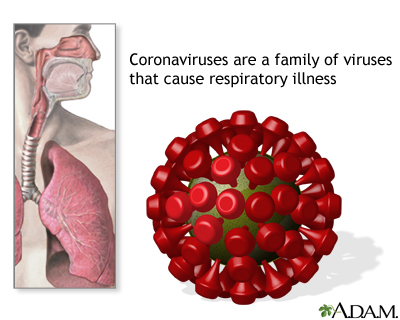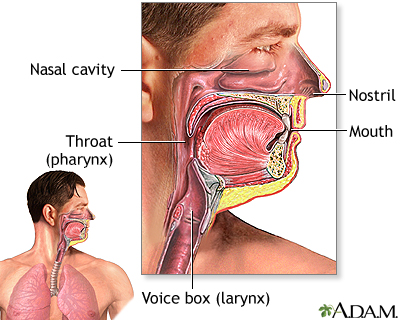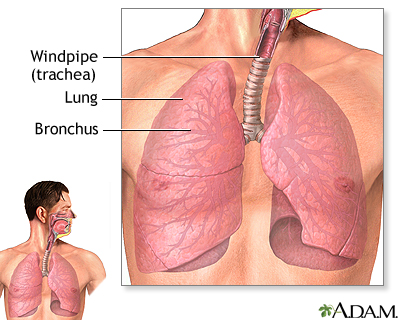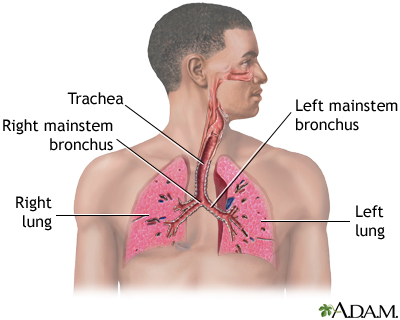Coronavirus
Coronaviruses are a family of viruses. Infection with these viruses generally causes mild to moderate respiratory illnesses, such as the common cold. Some coronaviruses cause severe illness that can lead to pneumonia, and even death.

Coronavirus
Coronaviruses are a family of viruses. Infection with these viruses can cause mild to moderate respiratory illnesses such as the common cold. Some coronaviruses may cause severe illness and lead to pneumonia or even death.
Causes
There are many different coronaviruses. They affect both humans and animals. Common human coronaviruses cause mild to moderate illnesses, such as the common cold.
Common cold
The common cold most often causes a runny nose, nasal congestion, and sneezing. You may also have a sore throat, cough, headache, or other symptoms....

Common cold - Animation
Most people have a general idea that when they start sneezing, their nose is runny, and their throat is scratchy, they're getting a cold. But what do you do about it? The common cold is something very common that people usually get on average three or more times during a year. And it is a virus that's primarily in the nose. The three main symptoms of a cold are sneezing, nasal stuffiness, and runny nose. You may have other symptoms, like having a fever of 100? or 101?, or you may have some tickling or scratchiness in the back of your throat. In fact, that may be the very first symptom, a little scratch in the back of your throat. Then after a couple days the nasal discharge tends to turn a little bit darker, maybe a little greener. Then after about a week, you're all the way better. So, what's the best way to treat a cold? The first thing you need is plenty of rest and fluids. Water, juice, and clear broth can help replace fluids you may lose during a fever. Chicken soup is another great choice, in fact, it can help relieve congestion. In short, chicken soup really is good food. Over-the-counter oral cold and cough medicines may help ease adult symptoms, but they don't treat the virus that caused your cold. In fact, so far there is no cure for the common cold. ALSO, don't give a child under 6 any cold medicines, they won't help your child, and they may have serious side effects. And antibiotics? They won't help a cold, and, if you take them too often, antibiotics can break down your body's ability to benefit from them in the future when you may really need them, such as when you get the flu. In general, remember that getting plenty of rest and fluids is the best way to help you deal with your cold symptoms. Eventually, your cold symptoms usually go away, probably in about a week. If you still feel sick after a week, see your doctor to rule out a sinus infection, allergies, or any other medical problem.
Some animal coronaviruses evolve (mutate) and are passed from animals to humans. They may then spread through person-to-person contact. The coronaviruses that spread from animals to humans can sometimes cause more severe illness:
- Severe acute respiratory syndrome (SARS) is a serious form of pneumonia. It is caused by the SARS-CoV coronavirus. No cases in humans have been reported since 2004.
Severe acute respiratory syndrome (SARS
Severe acute respiratory syndrome (SARS) is a serious form of pneumonia. Infection with the SARS virus may cause acute respiratory distress (severe ...
 ImageRead Article Now Book Mark Article
ImageRead Article Now Book Mark ArticlePneumonia
Pneumonia is inflamed or swollen lung tissue due to infection with a germ. Viral pneumonia is caused by a virus.
 ImageRead Article Now Book Mark Article
ImageRead Article Now Book Mark Article - Middle East Respiratory Syndrome (MERS) is a severe respiratory illness. MERS is caused by the MERS-CoV coronavirus. About 30% of people who have gotten this illness have died. Some people only have mild symptoms. MERS continues to cause illness in humans, mainly in the Arabian Peninsula.
Middle East Respiratory Syndrome (MERS)
Middle East Respiratory Syndrome (MERS) is a severe respiratory illness that mainly involves the upper respiratory tract. It causes fever, coughing,...
Read Article Now Book Mark Article - COVID-19 can be a respiratory illness that causes cold or flu-like symptoms, but it can also affect other parts of your body. It is caused by the SARS-CoV-2 virus (severe acute respiratory syndrome coronavirus 2). COVID-19 can be a mild to serious illness and even fatal. COVID-19 is a serious public health threat globally and in the United States.
COVID-19
Coronavirus disease 2019 (COVID-19) is a respiratory illness that causes fever, coughing, and shortness of breath, but many other symptoms can occur....
 ImageRead Article Now Book Mark Article
ImageRead Article Now Book Mark Article
Many coronaviruses originate in bats, which can then infect other animals. SARS-CoV spreads from civet cats, while MERS-CoV spreads from camels. The latest virus, SARS-CoV-2, is also suspected to have originated from animals. It is from the same family of viruses as SARS-CoV, which is why they have similar names. There are many other coronaviruses circulating in animals, but they haven't spread to humans.
Once a person has been infected by a coronavirus, the infection can spread to a healthy person (person-to-person transmission). You can catch coronavirus infection when:
- An infected person sneezes, coughs, or blows their nose near you and releases the virus into the air (droplet infection)
- You touch, hug, shake hands with, or kiss an infected person
Symptoms
Human coronaviruses that cause the common cold spread from person-to-person. Symptoms develop in 2 to 14 days. These include:
- Runny nose
Runny nose
A stuffy or congested nose occurs when the tissues lining it become swollen. The swelling is due to inflamed blood vessels. The problem may also in...
 ImageRead Article Now Book Mark Article
ImageRead Article Now Book Mark Article - Sore throat
Sore throat
Pharyngitis, or sore throat, is discomfort, pain, or scratchiness in the throat. It often makes it painful to swallow.
 ImageRead Article Now Book Mark Article
ImageRead Article Now Book Mark Article - Sneezing
Sneezing
A sneeze is a sudden, forceful, uncontrolled burst of air through the nose and mouth.
 ImageRead Article Now Book Mark Article
ImageRead Article Now Book Mark Article - Nasal congestion
- Fever, often with chills
Fever, often with chills
Fever is the temporary increase in the body's temperature in response to a disease or illness. A child has a fever when the temperature is at or abov...
 ImageRead Article Now Book Mark Article
ImageRead Article Now Book Mark Article - Headache
- Body aches
- Cough
Cough
Coughing is an important way to keep your throat and airways clear. But too much coughing may mean you have a disease or disorder. Some coughs are d...
 ImageRead Article Now Book Mark Article
ImageRead Article Now Book Mark Article
Exposure to MERS-CoV, SARS-CoV, and SARS-CoV-2 can cause severe symptoms. These include:
- Nausea and vomiting
- Shortness of breath
Shortness of breath
Breathing difficulty may involve:Difficult breathing Uncomfortable breathingFeeling like you are not getting enough air
 ImageRead Article Now Book Mark Article
ImageRead Article Now Book Mark Article - Diarrhea
- Blood in cough
Blood in cough
Coughing up blood is the spitting up of blood or bloody mucus from the lungs and throat (respiratory tract). Hemoptysis is the medical term for cough...
 ImageRead Article Now Book Mark Article
ImageRead Article Now Book Mark Article - Death
Severe coronavirus infection may cause:
- Croup
Croup
Croup is an infection of the upper airways that causes breathing difficulty and a barking cough. Croup is due to swelling around the vocal cords. I...
 ImageRead Article Now Book Mark Article
ImageRead Article Now Book Mark Article - Pneumonia
Pneumonia
Pneumonia is inflamed or swollen lung tissue due to infection with a germ. Viral pneumonia is caused by a virus.
 ImageRead Article Now Book Mark Article
ImageRead Article Now Book Mark Article - Bronchiolitis
Bronchiolitis
Bronchiolitis is swelling and mucus buildup in the smallest air passages in the lungs (bronchioles). It is usually due to a viral infection....
 ImageRead Article Now Book Mark Article
ImageRead Article Now Book Mark Article - Bronchitis
Bronchitis
Acute bronchitis is swelling and inflamed tissue in the bronchi, the main passages that carry air to the lungs. This swelling narrows the airways, w...
 ImageRead Article Now Book Mark Article
ImageRead Article Now Book Mark Article
Symptoms may be severe in certain people:
- Children
- Older adults
- People with chronic conditions such as diabetes, cancer, chronic kidney disease, heart disease, or HIV infection
- People with respiratory illnesses such as asthma or COPD
Pneumonia - Animation
Everyone coughs from time to time. You might pick up a cold, have an allergy, or just get a tickle from something irritating your throat. But if you're really hacking and coughing up yellow or green mucus, and you've also got a fever, chills, and shortness of breath, you may have picked up a more serious infection, called pneumonia. And sometimes pneumonia's symptoms aren't as obvious. Pneumonia is caused by an infection in your lung. Bacteria or viruses like these can sometimes get into your lungs through your nose or mouth and make you sick. You're more likely to get pneumonia if you've got a problem with your immune system that makes it harder to fight off infections. You're also at greater risk if you've got a lung disease like COPD or cystic fibrosis, you've recently had the flu, or you're exposed to cigarette smoke. People who live in nursing homes are also more likely to get pneumonia. With pneumonia, you may cough up greenish or yellow phlegm. You also may run a fever and have the chills. Pneumonia can make it hard to breathe. You may feel like you've run up a flight of stairs when you were just sitting still. Your doctor can tell that you have pneumonia and not just a cold by listening with a stethoscope for crackle sounds in your chest. You may need a chest x-ray or blood tests to know for sure that you have pneumonia. If bacteria caused your pneumonia, your doctor can give you antibiotics, drugs that kill bacteria. Keep taking the antibiotic until you finish the whole prescription so you don't re-infect yourself. To help loosen all of that mucus clogging your lungs, breathe in the warm mist from a humidifier and drink plenty of water. Take it easy too. Don't try to run back to work and infect everyone else. Rest until you feel better. Whatever you do, don't smoke, it will only make your pneumonia worse. If your pneumonia is really severe or you have another serious health problem, your doctor may recommend that you get treated in the hospital. While there, you'll get antibiotics and fluids through a vein. You may also be given oxygen to help you breathe easier. The best way to deal with pneumonia is to avoid getting it in the first place. Older adults, children, and people with serious conditions like diabetes, asthma, cancer, and emphysema should talk to their doctor about getting vaccinated against pneumonia and the illnesses that cause it. Once you get treated, your pneumonia should clear up within a couple of weeks. Your doctor may want to check your lungs to make sure they're clear. Sometimes pneumonia can lead to serious lung complications, so call your doctor right away if your breathing problems get worse, you have chest pain, or you cough up blood.
Exams and Tests
Your health care provider may take a sample of the following for laboratory testing:
- Nasal swab (from the nostrils) or throat swab for a polymerase chain reaction (PCR) test for SARS-CoV-2 or other viruses
Polymerase chain reaction (PCR) test
Testing for the virus that causes COVID-19 involves taking a mucus sample from your upper respiratory tract. This test is used to diagnose COVID-19....
 ImageRead Article Now Book Mark Article
ImageRead Article Now Book Mark Article - Blood tests
- Sputum culture
Stool and urine samples may also be taken in some cases.
You may need further testing if your infection is severe. These tests may include:
- Blood chemistry tests
Blood chemistry tests
A comprehensive metabolic panel is a group of blood tests. They provide an overall picture of your body's chemical balance and metabolism. Metaboli...
 ImageRead Article Now Book Mark Article
ImageRead Article Now Book Mark Article - Chest x-ray or chest CT scan
Chest x-ray
A chest x-ray is an x-ray of the chest, lungs, heart, large arteries, ribs, and diaphragm.
 ImageRead Article Now Book Mark Article
ImageRead Article Now Book Mark ArticleChest CT scan
A chest CT (computed tomography) scan is an imaging method that uses x-rays to create cross-sectional pictures of the chest and upper abdomen....
 ImageRead Article Now Book Mark Article
ImageRead Article Now Book Mark Article - Complete blood count (CBC)
Complete blood count (CBC)
A complete blood count (CBC) test measures the following:The number of white blood cells (WBC count)The number of red blood cells (RBC count)The numb...
 ImageRead Article Now Book Mark Article
ImageRead Article Now Book Mark Article
Diagnostic tests may not be available for all kinds of coronavirus.
Treatment
At this time, there is no specific treatment for coronavirus infection except for SARS-CoV-2. For a coronavirus infection not due to SARS-CoV-2, medicines are given only to ease your symptoms. Experimental treatments are sometimes used in severe cases.
Mild coronavirus infections, such as the common cold, will go away in a few days with rest and self care at home.
Rest and self care at home
Colds are very common. A visit with your health care provider is often not needed, and most colds get better in about a week. Some symptoms, such a...

If you are suspected to have a severe coronavirus infection and are treated in a hospital, you may:
- Have to wear a face mask
Face mask
In places where respiratory viruses are spreading, wearing a face mask in public helps protect other people from possible infection with viruses such...
 ImageRead Article Now Book Mark Article
ImageRead Article Now Book Mark Article - Stay in an isolated room or ICU for treatment
Treatment for severe infections may include:
- Antibiotics, only if you also have bacterial pneumonia
- Antiviral medicines
- Steroids
- Oxygen, breathing support (mechanical ventilation), or chest therapy
Treatment for COVID-19, the illness due to SARS-CoV-2, may involve additional antiviral medicines.
COVID-19
Coronavirus disease 2019 (COVID-19) is a respiratory illness that causes fever, coughing, and shortness of breath, but many other symptoms can occur....

Outlook (Prognosis)
Common colds due to coronavirus usually resolve on their own. Severe coronavirus infections may require hospitalization and breathing support. Rarely, certain severe coronavirus infections may lead to death, especially in older people, children, or people with chronic conditions.
Possible Complications
Coronavirus infections may lead to bronchitis or pneumonia. Some severe forms may cause organ failure, and even death. Infection with SARS-CoV-2 may lead to long COVID (also called post-acute sequelae of COVID-19) in some people.
Long COVID
Most people who have COVID-19 recover completely. Some people continue to have health problems after having COVID-19. This is called long COVID. Lo...

When to Contact a Medical Professional
Contact your provider if you have:
- Come in contact with a person with a severe coronavirus infection
- Travelled to a place which had an outbreak of a coronavirus infection and have developed common cold symptoms, shortness of breath, nausea, or diarrhea
Prevention
Follow these steps to lower your risk of infection:
- Avoid contact with people who have coronavirus infection.
- Avoid travelling to places that have an outbreak of coronavirus infection.
- Wash your hands properly or clean them with an alcohol-based hand sanitizer.
Wash your hands properly
Washing your hands often during the day is an important way to help reduce the spread of germs and prevent illness. Learn when you should wash your ...
 ImageRead Article Now Book Mark Article
ImageRead Article Now Book Mark Article - Cover your mouth and nose with a tissue or sleeve (not your hands) when you sneeze or cough. Throw the tissue away.
- Do not share food, drink, or utensils.
- Clean commonly touched surfaces with a disinfectant.
There are vaccines that can prevent severe disease with COVID-19. Contact your local health department to find out about availability in your area. Information about COVID-19 vaccines is available from the Centers for Disease Control and Prevention at www.cdc.gov/covid/vaccines/index.html.
Vaccines
COVID-19 vaccines are used to prepare the body's immune system to protect against COVID-19. Everyone ages 6 months and older should get a 2024-2025 C...

If you are travelling, talk to your provider about:
- Being up-to-date with vaccines
- Taking self-test kits
Self-test kits
Self-testing for COVID-19 can be done using an over-the-counter (OTC) rapid antigen test to find out if you have COVID-19 infection. An OTC test for...
 ImageRead Article Now Book Mark Article
ImageRead Article Now Book Mark Article - Carrying medicines
Reviewed By
Frank D. Brodkey, MD, FCCM, Associate Professor, Section of Pulmonary and Critical Care Medicine, University of Wisconsin School of Medicine and Public Health, Madison, WI. Internal review and update on 07/16/2024 by David C. Dugdale, MD, Medical Director, Brenda Conaway, Editorial Director, and the A.D.A.M. Editorial team
Centers for Disease Control and Prevention website. About COVID-19. www.cdc.gov/covid/about/. Updated June13, 2024. Accessed August 21, 2024.
Havers FP, Kirking H, Plumb ID. PRE-2019 coronaviruses. In: Goldman L, Cooney KA, eds. Goldman-Cecil Medicine. 27th ed. Philadelphia, PA: Elsevier; 2024:chap 334.
Perlman S, McIntosh K. Coronaviruses, including severe acute respiratory syndrome (SARS) and Middle East respiratory syndrome (MERS). In: Bennett JE, Dolin R, Blaser MJ eds. Mandell, Douglas, and Bennett's Principles and Practice of Infectious Diseases. 9th ed. Philadelphia, PA: Elsevier; 2020:chap 155.
World Health Organization website. Coronavirus disease (COVID-19). www.who.int/health-topics/coronavirus#tab=tab_1. Accessed August 21, 2024.








 All rights reserved.
All rights reserved.